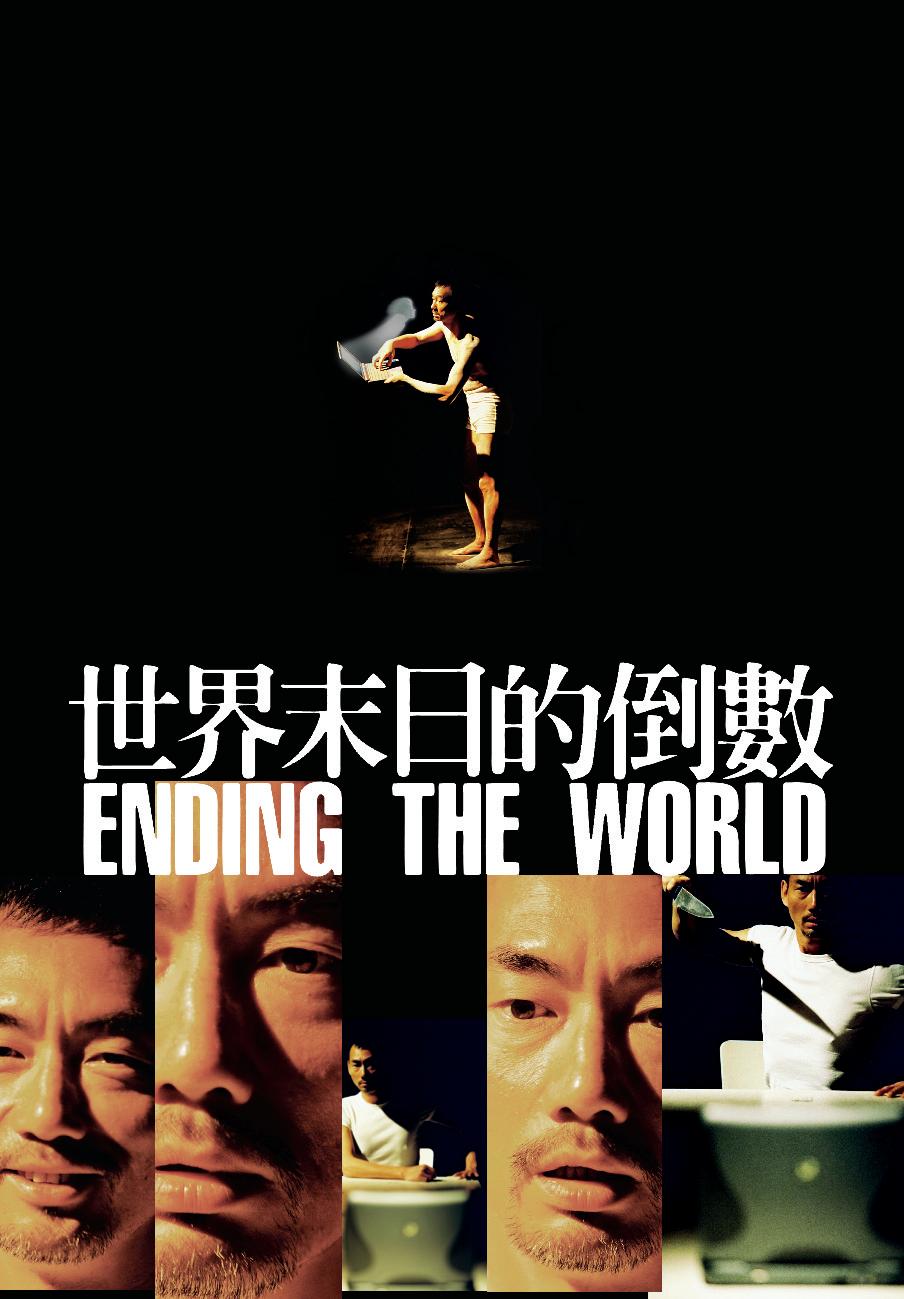

世界末日的倒數 Ending the World
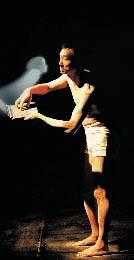
封面照片Cover photographs © 謝明莊
綵排照片Rehearsal photographs © Cheung Chi-wai
創作及演出 Credits
3 - 5.3.2006 10 - 12.3.2006 7 9 10 11 13 14 24
前進進牛棚劇場 On & On Theatre, Cattle Depot
演出長約 1 小時 20 分鐘,不設中場 休息
Running time: approximately 1 hour and 20 minutes with no interval
故事 Synopsis
編劇的話
導演的話
演員的話
特稿 Feature
演員及創作人員介紹 Biographies
香港藝術節委約 Commissioned by the Hong Kong Arts Festival
為了讓大家對這次演出留下美好印象,請切記在節目開始前關掉手錶、無㵟電話及傳呼 機的響鬧裝置。會場內請勿擅自攝影、錄音或錄影,亦不可飲食和吸煙 ,多謝合作。
To make this performance a pleasant experience for the artists and other members of the audience, PLEASE switch off your alarm watches, MOBILE PHONES and PAGERS. Eating and drinking, unauthorised photography and audio or video recording are forbidden in the auditorium. Thank you for your co-operation.
意念 及 劇本創作 梵谷
導演 梵谷
排練指導 陳炳釗
監製 鍾小梅
演員
梁遠光、梁曉端*、吳偉碩 作曲 曾永曦
燈光設計 張帆
舞台設計 蔡少欽
舞台監督 鄺美兒
後台工作人員 戚俊豪、林子琪
錄像製作 吳江偉
宣傳錄像製作 陳錦樂
鳴謝 Acknowledgements
Andy Ng Concept and Playwright
Andy Ng Director
Chan Ping-chiu Dramaturge
Ribble Chung Producer
Performers
Walter Leung, Melissa Leung* and Andy Ng
Wilson Tsang Composer
Cheung Fan Lighting Designer
Murphy Tsai Stage Designer
Dingdong Kwong Stage Manager
Chik Chun-ho and Lam Tsz-ki Stage Assistants
Ng Kwong-wai Video Production
Chan Kam-lok Promotional Trailer Production
前進進戲劇工作坊 On & On Theatre Workshop
楊慧儀博士 Jessica Yeung
實踐表演藝術學院劇場訓練與研究課程(新加坡)
Theatre Training and Research Programme (Singapore)
劇場組合 Theatre Ensemble
樹寧.現在式單位 Shu Ning Presentation Unit
香港戲劇獎學金
陳明朗 Chan Ming-long
演後藝人談 Meet-the-Artist (Post-Performance) 4.3.2006 (六Sat) and 11.3.2006 (六Sat)
歡迎觀眾演出後留步,與導演及演員見面 If you would like to meet the director and the cast, please stay behind in the auditorium after the performance
* 蒙劇場組合允許參與是次演出
Appearance by kind permission of Theatre Ensemble
靈感來自艾倫.萊特曼作品《愛因斯坦的夢》
一個老人打算寫一個關於末世的故事,但是他想起了他曾經飼養的熱帶 魚,於 是,他說了一個關於熱帶魚的故事,然後,熱帶魚讓他想起了另一個養熱帶魚的 人,這樣,他就無緣無故地說出了另一個人的故事。所以,這其實是關於一個老 人在說故事的故事。噢,不,這個老人同時又說了一個、兩個、三個︙︙甚至是 很多個人的故事, 所以,這應該變成了老人在說一個關於人的故事︙︙只是一 個故事︙︙噢,慢着,這其實又不只是一個故事,當所有人都要面對死 亡的時 候︙︙
Inspired by Alan Lightman’s Einstein’s Dreams
An elderly man planned to write a story about the end of the world, but then he thought of the tropical fish he once kept, and so he told a story about tropical fish. Then the tropical fish led him to think of someone else who kept tropical fish. In this way, for no special reason at all, he started telling the story of this person. So, this actually is a story about an elderly person telling a story. Oh, no. This elderly man simultaneously told one, two, three ... in fact, many individual stories. So, it should be changed to an elderly man telling the story about people... only one story... Oh, wait a minute, it actually is not just one story. It’s about everyone when they come to the time when they must face death..
Translated by Pan Shih
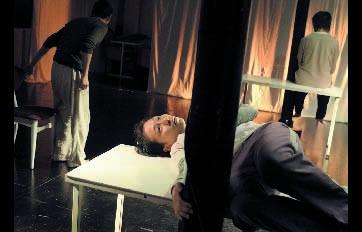
現在和真實
或
許是因為在年紀很輕的時候便已經 目睹了死亡,而且不止一次,所 以,對於「死」,總覺得就像是吃一 頓家常飯一樣,隨時都會聽到它呼喚我埋 席的聲音。對於這種呼喚,我並沒有驚 怕,卻很想知道,到底它要請我吃的是一 頓什麼盛宴?又或者,只是清茶淡飯?
曾經,我以為我只是一個存在主義哲學的 信徒,把「死亡」當作人生的大命題來思 索。但在兩年前,因為應付另一個演出, 需要追蹤自己的過去,無意間記起了在 八、九歲時常常出現的一個夢,在夢况 面,我聽到自己的聲音,在一片黑暗中迴 盪,聲音在問:
「人死冲之後會變成乜野?」
「如果係變成鬼,咁無問題呀,我唔驚 呀!」我聽到自己的回答。
「咁會唔會變成另外一個人,又或者另外一 種動物蕂?」
「如果係咁樣,我仲可以想像有另外一個 我,甚至係另外一隻我,話唔定,到時佢 地仲可以記得我呢個人,記得我一生。」
「唔係喎,過奈何橋要飲孟婆湯果喎,飲 完之後就乜野都唔記得喎!」
「失去所有簕記憶!乜都唔記得!我身邊簕 人就咁消失?我簕過去就咁消失!我就咁 消失!我係乜野?我係邊個?就連想像都 唔可以?」
每次,當我的聲音說到這况的時候,我就 不可以再忍受,我會迫自己張開雙眼,迫
自己見到熟悉的天花,或者見到床邊周圍 熟悉的一切,這樣,我就不會再聽到夢中 那自己的聲音。
原來,所以思想死亡,不過是因為對生的 不捨,那一切一切,就連記憶也不放過。
宗教都是教人逃脫死亡陰影的,這樣便可 以讓我們在生時看到了光明。於是,我們 一直在想像着將來,追求着將來、將來、 將來︙︙那怕是死後的將來︙︙就這樣, 我們都委身於那些為我們描畫將來的人。 又或者,我們自己就是那一直戴上了只能 目睹將來的眼罩的人,也在努力描畫甚至 乎也用力地建設着將來。只是,正如面對 着越來越多虛擬遊戲的生產,有人提出了 警告,當虛擬看多了,沉迷其中的人是會 分不清虛擬與真實的界線。那被描畫的將 來,又會不會讓人沉迷其中,結果反而教 我們看不清現在,摸不清真實?
於是我問,什麼才算是現在和真實?我想 到,應該是過去罷,那發生了的一切,那 無法否定的一切,正因為這一切,結果構 成了現在;甚至,影響延伸到將來。至於 真實,卻反而是最模糊的,因為,世間一 切不過是現象的總合,是色、受、想、 行、識的化身,所以,要知道真實,不如 說要追問自己究竟是用一種怎樣的眼光來 凝視這個世界。
或許有人會問,為什麼要追問「現在」和「真 實」?我只是想到,經過那剝蝕人心、如遭 逢末世瘟疫的打擊之後,人,應該要懂得 的是
不好再「迷惑」了,不是嗎?
發自角色身體深處抖動的聲音
在排練的時候,陳炳釗一直在提醒 我,着我不要受到自己所寫的劇 本原意所影響,可以純粹從導演 的角度來考慮戲與觀眾的溝通問題和再詮 釋的問題。我同意他的看法,也試着把自 己抽離去處理關於觀眾如何閱讀這齣戲的 一切問題。但是,我有一個想法,那是從 寫劇本開始到排練都沒有改變過的,我希 望觀眾不只是看到一個故事,而且更聽到 一種發自角色身體深處抖動的聲音。
聲音,往往被文字或言語支配了,別人以 為聽到的,其實只是某個內容、某種想 法;相反的,那個說話的人的真意卻往往 被忽略了。我記得很清楚,年少氣盛的時 候,絕對不喜歡自己的人生被大人所支 配。所以,每次母親語重心長地勸自己找 一份可以賺錢的工作時,我便會大發脾 氣,因為,她的話絕對和我的想法相違 背。我聽到的只是「想法」,卻「聽」不到她 聲音中那源自關懷的深意。
演員在舞台上能夠老老實實的看、老老實 實的聽、老老實實的動,原來是很難的。
因為,那必需要不為雜念所動,靜心的把 自己和自己內况的聲音連在一起,這才有 機會聽出角色自己要說話的原由。其實, 無論我們想什麼,也都不過源自填補自己 遺憾和滿足自己慾望的需要。我希望,可 以為每一個演員(包括我自己),找到這種 作為一個人和角色存在的依據。
只有角色能夠老實地觸摸自己的存在,觀 眾才有機會感知舞台上的生命世界,而不 僅僅在閱讀一個故事。我是如此地相信 着︙︙

我的末日可以在下一刻
梁遠光
有人說劇場所談論的都是關於人世間的事 情,而人世間最重的事情不外乎生和 死︙︙
在排練的過程,我記起小三時的學校旅 行。當日大部份的同學、老師和校工們一 起到沙灘燒烤,當中包括容叔。容叔是專 門賣書簿給學生的校工,他經常掛在臉上 慈祥的笑容,令學生都很喜歡親近他。那 天,他興高采烈地和我們玩耍、玩風箏, 在他要拾回掉在地下的風箏時,他暈倒 了。
救護車響號、救護人員、急救、救護車急 速離開︙︙
第二天,老師向所有學生宣佈,容叔因心 臟病發,昨日過身了︙︙
沙士、南亞海嘯、甚至是埃及旅行團的車 禍,令我愈來愈覺得,我的末日( 死亡) 原來 可以在任何一刻來臨,包括下一刻。所 以,可以倒數自己或者世界的末日,可能 是非常幸福的事情︙︙
花開、花又落,你現在最想做的是什麼?
表演藝術的意義
梁曉端
寫了一句又一句,想了想,又刪去那一句 句。摸不着要以什麼角度寫,怎樣寫,但 確實很想寫。
學藝三年,沒有宏願,只知道要腳踏實地 一步一步的走。走在自己的生活况,走在 大家的生活况。
看見前輩努力經營了十多二十年,各自各 精采,心况暗暗想着,我也會有這樣的成 就嗎?忽然,那聲音對我說:「沒錯,有一
天你要成為一位大家都認同的表演藝術 家,為人民服務。」
嘩,由我下決心要當演員起,從未試過如 此胸懷大志。什麼才是大家都認同?我 問。是信念,戲劇表演的理念,是人與人 之間真誠的溝通。包容和接納的胸襟,對 別人關懷的尊重,堅持理想的耐心。
就是這樣,我依然存在,食飯、去廁所、 覺,繼續思考表演藝術對自己/觀眾的 意義。
梵谷的倒數
文:米高.英咸
不妨想像這是地球上的最後一天。
某些荷里活電影式的大劇變正在 降臨,且再也沒有英雄來拯救世 界。你在這最後一天會做什麼呢?退休、 升職或串連同事甲密謀打擊同事乙這類計 劃,都已變得沒有意義。那麼,你打算怎 麼度過這寶貴的最後二十四小時?這是梵 谷(吳偉碩)的《世界末日的倒數》的基本假 設。這齣引人入勝、也發人深思的戲,在 第三十四屆香港藝術節上首演。觀看梵谷 與梁遠光和梁曉端排練這齣構思新穎、風 格獨特的戲,我為戲中那無比質樸的意念 所震懾。人類的關係,應該更自然、誠 實、真誠和單純些啊(對唔住,我係呢度講 老土話)!
吳偉碩這齣戲,實際上要比這短文所言的 更有深度。整個意念,是透過一個老人的 富創意的想像表現出來的。這老人坐在舞 台後方,用電腦滴滴答答地把他的故事打 出來。隨着他的文字出現在舞台後方中央 的屏幕上,故事便展開,並在我們面前演 出。我們超越時空,穿梭於作家的意識 中,參與他的希望、恐懼和回憶。
兩名演員梁遠光和梁曉端,都在香港頗有 來頭的劇團例如「劇場組合 」和「前進進戲 劇工作坊」磨練過。在戲中,他們既代表老 人的創作,又代表老人的「他我」。演老作 家的吳偉碩把腰幾乎折了一半,他緩慢地 走過舞台後部區域,隨着他踏入創作過程 的死胡同,他亦顯得愈來愈沮喪。突然, 靈光一閃,他回到電腦前,有節奏地打出 他的故事。
作曲家曾永曦的配樂,巧妙而靈活地突出 了演員動作的節奏,使我們明白到,一如 貝克特等擅於表現心靈與記憶的劇作家在 他們的作品中所證,節奏是戲劇的重心。
而在前台,他奔放的想像和記憶(表現在兩 位青年演員身上)眼看就要取得控制權,把 敘述帶往其他地方,這也許是有意識的創 造性思想的戒律遭到放縱的潛意識侵擾的 例子。故事中的人物在一次精采的啞劇表 演中相遇和相愛,這啞劇演活了初戀的難 以捉摸和戀人那種情迷意亂的嬉鬧,新鮮 而神奇的兩人世界取代了慣常的唯我論的 生活經驗。作家幾乎對其筆下人物的快樂 生起嫉妒心,並覺得他那世界末日故事已 被他虛構的這對放肆的戀人劫走了。隨着 他力圖控制他的故事,他逐漸像貝克特筆 下的克拉普那樣,必須面對他回憶中那苦 樂參半的況味。他挺起身,企圖變成以前 那個舊我。演員再被召來完成這個使命, 於是「造物主」的兩個玩偶向世界說再見, 再次離開他們指定的空間,以便又一次推 翻故事。
舞台空間是開放的,尤其是配合前進進牛 棚劇場這個相稱的表演場地,具有刺激的 視覺效果,且極能襯托出戲中的氣氛。舞 台背景的主體,狀似一隻眼睛,一個大魚 缸象徵瞳仁,既暗示思想的眼睛,也暗示 作家那偷窺的目光 他創造的角色正在 為他和我們這些觀眾表演。舞台地板的設 計令人想起作家那豐富的想像力,日常的 地面物件凌亂地飛離,飛入深藍色的頂 端。我們人類的生存,被限制在魚缸內, 魚缸象徵着你死我活的生存鬥爭,那是一 個大魚吃小魚、伺機佔便宜的世界。而作
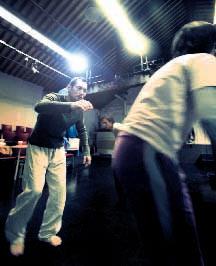
家想像中的末日景象,正是為了干擾這種 生存狀態。
吳偉碩想像力豐富,導演技巧老練,把故 事變成對我們的現代價值體系的含蓄批 評。在這個價值體系內,我們總是為一個 永不兌現的未來而活着,追求各種物質目 標,這些目標要麼無法達到,要麼達到卻 總是不能給我們帶來精神營養和快樂。吳 偉碩如今已是香港最當紅的舞台演員之 一,這齣設計新穎的戲令他可以實踐多年 前在新加坡所受的東方表演藝術的嚴格訓 練。
他在新加坡師從兩位有影響的人物,他們 是名劇《鄭和的後代》作者郭寶崑和他的舞 蹈家妻子吳麗娟。可惜,郭寶崑已仙逝, 但是身為該校行政顧問的吳麗娟,這次來 看預演,我有幸跟她傾談藝術趨勢、香港 與新加坡的異同和她這位學生的新作品。
她坦言表演藝術需要刻苦、誠實和深度,
容不得文化虛偽和商業化的散漫,藝術不 能被當作一門全球化的生意。這番話可謂 說到要害。
談到吳偉碩時,她說:「吳偉碩代表了真正 的香港文化。他的戲是關於人和真實的人 生經驗。」在吳女士看來,這樣的作品只能 產生於嚴格的藝術訓練,而這種訓練往往 是寂寞而孤獨的,但像吳偉碩這樣的藝術 家,是打造真正文化的基石。
位於東九龍的牛棚藝術村,並非世界的終 點,儘管在中環的常客眼中,牛棚確是在 邊緣上。那是一個值得一遊的地方,從油 麻地或尖沙咀搭的士,很快就到。 牛棚是 舊時的政府牛隻檢疫中心,由一座紅磚平 房大院組成,在香港有特殊韻味。不管怎 麼樣,如果去牛棚不像去電影院那麼方 便,你也不必怕,畢竟這不是世界末日!
Andy Ng’s EndingtheWorld
by Mike Ingham
Imagine that it’s the last day on earth. Some Hollywood-type cataclysm is approaching and there are no more heroes left to save the planet. What do you do on your last day? Not much point in planning ahead for your retirement/ promotion or conspiring with colleague A to out-do colleague B, so how do you spend those last precious 24 hours? This is the basic premise for Andy Ng Wai-shek’s absorbing and thought-provoking play Ending the World which will have its premiere as part of the 34th Hong Kong Arts Festival. Watching Ng run through this conceptually rich and stylishly acted new work in rehearsal, together with collaborating actors Melissa Leung and Walter Leung, I was struck by the brilliant simplicity of the idea. All our human interactions would necessarily be more natural, honest, real and uncommercial (oops, forgive my ‘foul language’!).
Ng's play is actually more layered than this brief introduction implies. The concept is filtered through the creative imagination of an old man, who sits upstage left literally banging out his story on a word-processor. As his words appear on the screen upstage centre the story comes to life and is enacted before us. Space and time are transcended and we are taken on a journey through the writer’s consciousness,
involving his hopes, fears and memories. The young physical actors, Walter and Melissa, both of whom have gained valuable experience with established and respected Hong Kong physical theatre groups such as Theatre Ensemble and On and On Theatre, represent both the old man’s creations and his alter ego. Bent almost double as the old writer, Ng walks slowly across the upstage area, getting more and more frustrated as he goes down blind alleys in the creative process. Suddenly inspiration lights upon him and he returns to his word-processor, rhythmically hammering away at his story.
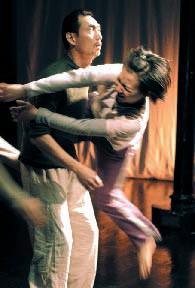
The rhythm of the action is deftly emphasized by composer Wilson Tang’s subtly supportive score and we realise that, as in the world of Samuel Beckett and other playwrights of mind and memory, rhythm is at the heart of the play.
Downstage the riot of his imagination and memory, as personified by the two younger actors, threatens to assume control, taking the narrative to other places, a case, perhaps of the wild subconscious undermining the discipline of the conscious creative mind. The characters of his story meet and fall in love in a wonderfully enacted mime, which externalises the uncertainties of first love and its deliriously ecstatic playfulness, as a new and magical dual world replaces the accustomed solipsistic experience of life. The writer is almost jealous of his creations’ happiness and feels that his end-of-the world story has been hijacked by this presumptuous pair of created lovers. As he wrestles for control of his story he is confronted, like Beckett’s character Krapp, with the bittersweet nature of his own reminiscences. He straightens up and attempts to metamorphose into the man he once was. The actors are brought back on mission and the ‘Creator’s’ puppets say their goodbyes to the world before departing again from their assigned space to subvert the tale once more.
The stage space is open and, in the fitting context of the On and On Theatre’s Cattle Depot venue, visually stimulating and atmospheric in its ambience. An eye-shaped stage backdrop with a large fish-bowl
representing the pupil of the eye, dominates the background decor, suggesting both the mind’s eye and the voyeuristic gaze of the author whose creations are performing for him and us, the audience. The stage-floor design evokes the crowded imagination of the author, in which everyday grounded objects fly off anarchically into a dark blue stratosphere. Our daily human existence, which the writer’s apocalyptic vision of the last day intends to disrupt, is contained inside the fish-bowl, which epitomises the mundane fight for survival, a world of ‘big fish’, ‘little fish’ and cunning ‘bottomfeeders’.
In Ng’s fertile imagination and skilful direction, the story becomes an implicit critique of our modern value-system, in which we are constantly living for a future that never comes, aiming at material goals that are either unachievable or, when achieved, inevitably fail to give us spiritual nourishment or happiness. This newly devised play has enabled Ng, now one of Hong Kong’s hottest theatre actors, to realise the benefits of his rigorous training in Eastern performing arts techniques in Singapore a few years ago. After basic training and stage experience in Hong Kong with groups like City Contemporary Dance Company, Sand and Bricks and Theatre Fanatico, he continued his studies at Singapore’s Practice Performing Arts School.
Two of the influential people with whom he worked in Singapore were acclaimed playwright Kuo Pao-kun, author of the well-known play, Descendents of the
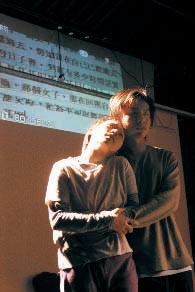
Eunuch Admiral , and Kuo’s wife, dancer Goh Lay-kuan. Sadly Kuo is no longer on this earth, but Goh Lay-kuan, executive advisor to the School was watching the run-through and I was lucky enough to talk to her about the state of the arts, about comparisons between Hong Kong and Singapore, and about her former mentee’s new work. Her forthright views on the need for hard work, honesty and depth in the quality of the performing arts as opposed to the cultural dishonesty and commercialised laziness of the arts as globalised business, struck a powerful chord. “Andy Ng, now he represents real Hong Kong culture,” she observed. “His play is about people and real human experience.” Such creative work, according to Goh, is based on an artistic discipline that can often be lonely, but
artists like Ng are the bedrock on which a genuine cultural formation is founded.
The Cattle Depot Artist Village at eastern Kowloon isn’t at The World’s End, although the denizens of the Central centre-of-theworld may consider it distinctly on the margins. It’s a short taxi ride from Yau Ma Tei or Tsim Sha Tsui, and well worth a visit. The former government abattoir, a redbrick, low-rise complex of buildings has a unique ethos in Hong Kong. Experience its fiercely independent, culturally authentic flavour and you won’t be disappointed. Anyway, if the trip to Ngau Paang (the Cantonese name, meaning literally ‘cattle depot’) is not quite as convenient as going to the cinema, it’s not the end of the world!
吳偉碩(梵谷) Andy Ng 編劇/導演/演員 Playwright, Director and Performer
吳偉碩在大專新聞系畢業後,從事電視劇本編寫工作外,同時開始接受 現代舞蹈訓練; 並由此而展開了舞蹈評論及戲劇評論寫作。後參與本地實驗劇團「沙磚上」多個創作之演 出、導演、監製及編劇工作。
1993 年進入「舞城」(城市當代舞蹈團二團),除參與訓練及表演,亦協助策劃《平台舞蹈 工程》,在大學校園推展環境舞蹈活動。 1995 年加入「瘋祭舞台」,並在其藝術總監何應 豐導演的大部份演出中擔任要角,部份作品並隨團遠赴北京、台北及東 京演出。
1997 年往倫敦修讀東西方戲劇比較理論, 2001 至 2003 年於新加坡實踐表演藝術學院研 讀「劇場訓練與研究課程」,學習日本能劇、中國京劇、印尼爪畦宮廷舞蹈 Wayang Wang 及印度 Bhartanatyam 舞蹈;同時又接受北京中央戲劇學院史坦尼拉夫斯基體系 及澳洲維多利亞藝術學院演員訓練系統之訓練。在學期間更努力開展其 訓練與理論之對 話,於倫敦米杜薩斯大學取得了碩士資格。
2004 年回港後,即參與「瘋祭舞台」《花開風來2》之演出,並兼任演員培訓指導。六月參 與「無人地帶」之《人、椅、龜》演出,並擔任創作工作。在同年八、九月間,獲母校新加 坡實踐表演藝術學院邀請,到新加坡參與該校第二屆畢業生畢業作品《The Water Station》的排練及演出。之後,又前赴台北參與「小亞細亞藝術網絡 2004 :跨領域工作 坊與創作人會議」。回港後,即被香港中文大學邀請作駐校藝術家,從事學生表演訓練 計劃。
去年參與的劇場作品,包括前進進戲劇工作坊主辦的導演創作坊的《與安德魯同桌》及 《欲望輪迴》,和瘋祭舞台的《蕪湖街上好風光》。又前往台北,參與《台港日 333 神曲計 劃》排練及世界首演,並在十一月於香港、大阪及東京進行巡迴演出。 2005 年初,在香 港中文大學「香港戲劇工程」及眾劇場作品山海經劇場《當波子蟹回來的時候》中擔任動作 指導及演出工作。
除致力於創作及演出等工作,吳偉碩(梵谷)同時擔任國際戲劇評論家協會(香港分會)副 主席。他也出任香港演藝學院、香港藝術學院及香港浸會大學之兼職講 師。
Andy Ng started his modern dance training after graduating from the Journalism Department of the Hong Kong Shue Yan College, while at the same time working as a scriptwriter at Television Broadcasts Limited and writing theat re critiques in local newspapers and magazines. He began his performing career by joining the local theatre group Sand & Bricks and the Dancing City (the 2nd group of the City Contemporary Dance Company). Ng is also a founding member of Theatre Fanatico, and has performed in many productions and tours since 1995.
In 1997 Ng furthered his studies in London, and gained his MA degree in East/West Theatre Studies at Middlesex University. Between 2001 and 2003, he joined the Theatre Training and Research Programme of the Practice Performing Arts School in Singapore, where he learnt modern acting techniques as well as training in four classical Asian theatre forms — Noh theatre from Japan; Beijing opera; Wayang Wang, the court dance from Indonesia; and Bhartanatyam from South India.
Returning to Hong Kong in 2004, Ng became involved in theatrical performances as actor, devisor and playwright. Currently he works as an actor and director, and is Vice Chairperson of the International Association of Theatre Critics (HK), as well as being invited to teach at the Hong Kong Academy for Performing Arts, The Arts School and the Hong Kong Baptist University.
陳炳釗 Chan Ping-chiu
排練指導 Dramaturge
陳炳釗為香港資深劇場編導、劇評人和教育劇場策劃。香港中文大學新 聞與傳播學系畢 業,其後於香港演藝學院進修戲劇,為學院首屆畢業生。畢業後曾先後創立實驗劇團「沙 磚上」及「臨流鳥」。現為「前進進戲劇工作坊」藝術總監。
1997 年回歸前後,陳炳釗以香港社會歷史和港人身份為題材創作的《飛吧!臨流鳥,飛 吧!》和《韋純在威斯堡的快樂旅程》廣獲好評,先後巡迴台灣、日本、挪威及芬蘭。由 九十年代中至今,陳炳釗策劃了一系列名為《i-D 兒女》的藝術教育計劃及演出。2001 年 起,前進進戲劇工作坊於牛棚藝術村建立前進進牛棚劇場,成為惟一本 地劇團自主營運 的獨立表演場地。2001年,陳炳釗獲美國文化協會頒發獎學金,前往紐約進修及觀摩。 近年重要的編導創作《不(手)女 N(魚)夫王》、《錯把太太當帽子的人》及《333 但丁神曲 之煉獄篇》等。
Chan Ping-chiu is a theatre director, playwright, actor and theatre-in-education curator. In 1988 Chan co-founded the experimental theatre group Sand & Bricks in 1988. He developed a series of works related to Hong Kong’s history and social conditions in the pre- and post-1997 period, and among the series, Vision Invisible: A Happy Journey was invited to tour to Taipei, Tokyo, Helsinki, Oslo and Bergen.
Chan joined On & On Theatre Workshop in 1998, and developed man y youth and educational theatre projects including the ‘i-D Generation’ series. In 2001, he received the Lee Hysan Foundation Fellowship from Asian Cultural Council to study in New York. Since his return Chan has been back on the stage in Fisherking and Handless Maiden, Oleanna and The Man Who Mistook His Wife for a Hat, Chan’s most recent project was Dante Divine’s Comedy. Chan is the Artistic Director of On & On Theatre Workshop.
鍾小梅 Ribble Chung
監製 Producer
鍾小梅於倫敦溫布頓藝術學院舞台設計系,獲一級榮譽學位畢業。回港 後曾為多個舞台 演出作舞台及服裝設計,有多年製作及策劃演出,國際會議、藝術文化 交流計劃及藝術 節。鍾小梅於 2003 成立了「文化工房」,專注推廣、監製及策劃香港藝術家於本地及海外 演出,包括李鎮洲演出的《棺材大過窿》,於香港首演及加拿大巡迴演出的王者匡及韋史 葛的《五行欠玩》。另外為「新視野藝術節 2004」製作梅卓燕的《流蓮歡》及楊惠美的《捕捉 流水》。 2004 年為前進進戲劇工作坊及新加坡實踐戲劇學院監製雙邊文化交流演出。 2004 年為澳門文化中心策劃文化節目。2005 年監製國際綜藝合家歡之節目《我爹爹係魔 術師》,並同年於澳門文化中心演出。
鍾小梅現為國際(香港)演藝評論家協會主席。
Ribble Chung graduated from the Wimbledon School of Art, London, with a First Class Honours degree in Theatre Design. Since her return in 1996, she has designed the set and costumes for many local theatre and dance productions. Chung is also an experienced arts manager and arts programmer. In 2003 Chung founded Cultural Factory and has produced The Coffin is Too Big for the Hole by Lee Chunchow; the world premiere of The 5 Elements in Hong Kong in 2003 and the Canada tour in 2004 by Harry Wong and Rick Scot; Lot • us by Mui Cheuk-yin; and Spiritual Girl by Yeung Wai-mei in the 2004 New Vision Arts Festival.
During 2004 she organised many cultural programmes for the Macau Cultural Centre. In 2005, she produced Made in Hong Kong with Harry Wong in Hong Kong and Macau. She is now the Chairman of the International Association of Theatre Critics (Hong Kong).
梁遠光 Walter Leung
演員 Performer
梁遠光先後於香港科技大學電腦系及新加坡「劇場訓練與研究課程」畢業。大學期間,梁 氏已積極參與校內及校外的劇場工作坊及演出。導演作品包括香港藝術 中心主辦的 「Wave2000」節目之一《2056 beta version 1.0》。
2002 及 2003 年間,先後獲得 Georgette Chen TTRP Scholarship Fund 的資助,以及 由香港藝術發展局頒發、香港戲劇協會統籌的香港戲劇獎學金。
2005 年參與的製作包括:演出及導演郭寶崑作品《鄭和的後代》、前進進戲劇工作坊《錯 把太太當帽子的人》中擔任助理導演 。
梁氏現為自由身戲劇工作者。
Walter Leung graduated from the Hong Kong University of Science and Technology in 1998 and the Theatre Training and Research Programme (TTRP) in Singapore in 2003. Throughout university Leung was an active and enthusiastic participant in theatre and theatre workshops organised by the university or other performing arts organisations. His first directing piece 2056 beta version 1.0 was presented in ‘WAVE 2000’ by the Hong Kong Arts Centre.
From 2001 to 2003 he received a scholarship from the Hong Kong Arts Development Council, and from 2002 to 2003 he received a Georgette Chen Theatre Training and Research Programme Scholarship to support his studies in Singapore. In 2005, he directed Descendants of the Eunuch Admiral, and worked as an assistant director for The Man Who Mistook his Wife for a Hat by On & On Theatre Workshop. Leung is now a freelance theatre worker.
梁曉端 Melissa Leung
演員 Performer
梁曉端出生於中國,六歲移居香港,於香港中文大學體育運動科學系畢業。2002年前往 新加坡修讀「劇場訓練與研究課程」,為第二屆畢業生。畢業作品為《The Water Station》。原創個人編作演出為《屋子要塌了!》,應2004 年雙邊文化交流計劃,於香港 演出交流。另一畢業演出為布萊希特《高加索灰闌記》。
梁曉端現為劇場組合全職演員。
Born in China, Melissa Leung moved to Hong Kong when she was six years old. She graduated from the Sports Science and Physical Education Department of the Chinese University of Hong Kong. Last year she graduated from the Theatre Training and Research Programme in Singapore.
As a student, Leung performed in The Water Station directed by Phillip B Zarrilli and The Caucasian Chalk Circle written by Bertolt Brecht, her final graduation performance. Her own creative work The Falling House, a solo performance, has been selected to tour to Hong Kong under the Bilateral Cultural Exchange Project 2004.
She is a full time actor in Theatre Ensemble.
曾永曦 Wilson Tsang
作曲 Composer
本地多元藝術家,創作範圍包括視覺藝術、平面藝術、插畫、音樂等。1996 年獲藝術發 展局資助出版故事書《十二個故事》; 2003 年初出版首張個人音樂專輯《Struck in Traffic》。曾永曦於 2004 年參與小亞細亞藝術交流計劃及澳門國際藝術節。他曾參與多 個獨立音樂計劃,如89268 編製的音樂集《Come out and Play》。 2005 年發表第二張唱 片《Little Cold Red》,其後他與台、港、日團體合作劇場演出《333 但丁神曲》。
Wilson Tsang is a visual artist, graphic designer, illustrator and musician, as well as singer-songwriter. He published Twelve Tales in 1996 (funded by the Arts Development Council), and his first solo CD Stuck in Traffic in early 2003.
Tsang has also been involved as a cross-media artist in the recent Little Asia Arts Exchange Network and the 2004 Worldwide Art Collective Festival held in Macau. He has contributed to various indie music projects such as the CD set Come Out and Play by 89268. In 2005, Wilson released his second solo album Little Cold Red and went on tour to Taipei, Hong Kong and Japan for Dante Divine’s Comedy.
張帆 Cheung Fan
燈光設計 Lighting Designer
香港演藝學院學士,主修舞台燈光設計。倫敦大學金匠學院碩士,主修 劇場教育。至今 作品繁多,是活躍於舞台燈光設計、劇本、小說等不同範疇的傳媒人、 創作人。
Cheung Fan is a graduate of the Hong Kong Academy for Performing Arts, where she obtained a degree in Theatre Lighting, and then went on to get a Master’s in Theatre Education from Goldsmiths College, University of London. She has participated in various productions and different arts forms including drama, movies and writing.
蔡少欽 Murphy Tsai
舞台設計 Set Designer
香港演藝學院榮譽學位畢業,主修應用美術。畢業後致力舞台及視覺藝 術創作,曾參與 三十多齣舞台製作,擔任編劇、導演、舞台設計、木偶設計及繪畫師等 。蔡少欽現為自 由身舞台及視藝工作者,「偶友街作」木偶劇團藝術總監及視藝組織「上格床」主席。
Murphy Tsai graduated from the Hong Kong Academy for Performing Arts with honours in Applied Arts. Since then he has focused on set and visual design and participated in over 30 theatre productions as playwright, director, set designer, puppet designer and illustrator. Tsai is a freelance theatre and visual arts worker. He is the Artistic Director of Make Friends with Puppet, and Chairman of a visual art group Upper Bunk.
鄺美兒 Dingdong Kwong
舞台監督 Stage Manager
去年為瘋祭舞台《蕪湖街上好風光》、東邊現代舞蹈團《後現代主義》及林龍傑創作室《帝 女花音樂劇場》任舞台監督,於前進進戲劇工作坊之《333 但丁神曲 》任技術統籌。
In 2005, Dingdong Kwong was involved in Springtime in the Wuhu Street by Theatre Fanatico, Post-modern Beauty by E-side Modern Dance Company, Dai Nu Fa-Music Theatre by Roger Lin Studio as stage manager. She also worked for On & On Theatre Workshop as a technical co-ordinator for the Hong Kong performances of Dante Divine’s Comedy.
